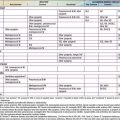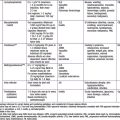Chapter 476 Acquired Inhibitors of Coagulation
Acquired circulating anticoagulants (inhibitors) are antibodies that react or cross react with clotting factors or components used in coagulation screening tests (phospholipids), thereby prolonging screening tests, such as prothrombin time and partial thromboplastin time. Some of these anticoagulants are autoantibodies that react with phospholipid and thereby interfere with clotting in vitro but not in vivo. The most common form of these antiphospholipid antibodies has been referred to as the lupus anticoagulant (Chapter 473). This anticoagulant is found in patients with systemic lupus erythematosus (Chapter 152), in those with other collagen-vascular diseases, and in association with HIV. In otherwise healthy children, spontaneous lupus-like inhibitors have developed transiently after incidental viral infection. These transient inhibitors are usually not associated with either bleeding or thrombosis.
Rarely, antibodies may arise spontaneously against a specific clotting factor, such as factor VIII or von Willebrand factor, similar to those seen more frequently in elderly patients. These patients are prone to excessive hemorrhage and may require specific treatment. In patients with a hereditary deficiency of a clotting factor (factor VIII or factor IX), antibodies may develop after exposure to transfused factor concentrates. These hemophilic inhibitory antibodies are discussed in Chapter 470.1.
Hunt BJ. Pediatric antiphospholipid antibodies and antiphospholipid syndrome. Semin Thromb Hemost. 2008;34:274-281.
Levine JS, Branch DW, Rauch J. The antiphospholipid syndrome. N Engl J Med. 2002;346:752-763.
Moraca RJ, Ragni MV. Acquired anti-FVIII inhibitors in children. Haemophilia. 2002;8:28-32.
Pipe SW, Goldenberg NA. Acquired hemostatic defects. In: Orkin SH, Nathan DG, Ginsberg D, et al, editors. Nathan and Oski’s hematology of infancy and childhood. ed 7. Philadelphia: Saunders Elsevier; 2009:1591-1622.
Roberts HR, Monroe DM, White GC. The use of recombinant factor VIIa in the treatment of bleeding disorders. Blood. 2004;104:3858-3864.




